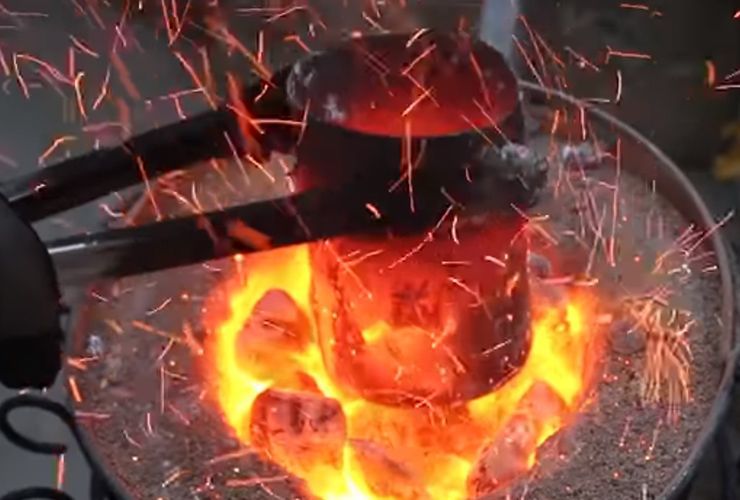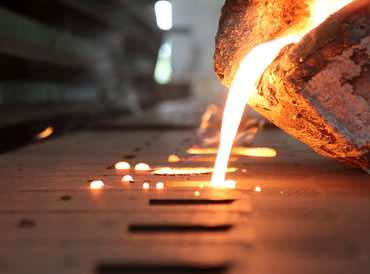What is an Aluminum Foundry in today’s industrial landscape
Wiki Article
Discovering the Function of a Metal Foundry in Modern Manufacturing Processes
Metal foundries are essential in the landscape of modern production. They offer crucial parts across different fields, adapting to the needs of industries like auto and aerospace. Advanced methods such as 3D printing and automated casting have actually transformed their procedures. In addition, sustainability has come to be a priority, influencing their techniques. As these foundries progress, the implications for producing performance and development are considerable, raising concerns concerning their future trajectory in an ever-changing economy.The Development of Metal Casting Strategies

With the increase of mass production, foundries took on approaches like die casting and shed foam casting, streamlining the manufacturing process and decreasing waste. Each advancement in metal casting techniques has accommodated the requirements of numerous sectors, from auto to aerospace. As metal casting continues to advance, the interplay in between strategy and modern technology continues to be vital in conference contemporary manufacturing difficulties, making sure that foundries prosper and adapt in an ever-changing landscape.
Assimilation of Advanced Technologies in Foundries
Although standard metal casting methods have offered the market well for centuries, the assimilation of sophisticated technologies in foundries is reinventing the manufacturing landscape. Automation and robotics simplify production procedures, enhancing effectiveness and reducing the danger of human mistake. As soon as difficult with conventional approaches, technologies such as 3D printing enable for rapid prototyping and the production of complicated geometries that were. Additionally, information analytics and the Web of Points (IoT) allow real-time monitoring and predictive upkeep, ultimately leading to decreased downtime and boosted productivity. These innovations likewise facilitate modification, enabling makers to react rapidly to market needs. As sustainability ends up being a top priority, the adoption of ecologically friendly modern technologies, such as electric melting heating systems and advanced sand improvement systems, better demonstrates the sector's commitment to advancement. Collectively, these modern technologies not only boost functional effectiveness however additionally setting foundries at the center of modern manufacturing practices.The Effect of Material Scientific Research on Foundry Procedures
Material scientific research plays a crucial role in boosting shop procedures, affecting both the option of products and the general casting process. Advancements in material scientific research supply a much deeper understanding of the homes of alloys and steels, making it possible for foundries to choose the most suitable products for certain applications. This understanding enhances the efficiency and durability of cast products, which is vital for meeting sector requirements.Technologies in product solutions and ingredients contribute to boosted casting techniques, lowering problems and maximizing manufacturing effectiveness. The growth of advanced metal compounds and smart materials allows foundries to produce lighter, stronger elements, which are significantly searched for in numerous fields such as automotive and aerospace.
In addition, product science aids in the recycling of metals, making procedures extra effective and cost-efficient. By leveraging the most up to date findings in product science, foundries can adjust to advancing market needs, guaranteeing their competition in a quickly changing manufacturing landscape.
Sustainability Practices in Modern Metal Foundries
With the expanding emphasis on ecological duty, contemporary metal foundries are progressively implementing sustainability techniques to decrease their ecological footprint (Aluminum Foundry). One vital method includes the recycling of scrap metal, which not just lowers waste however likewise conserves power and basic materials. Foundries are adopting sophisticated melting modern technologies that enhance energy effectiveness, consequently lowering greenhouse gas emissions. In addition, the use of eco friendly finishes and products has actually obtained grip, more lowering unsafe exhausts throughout manufacturingWater conservation methods, such as closed-loop air conditioning systems, are being implemented to lessen freshwater use. Many foundries are likewise buying sustainable energy resources, like solar and wind, to power their procedures, thereby decreasing reliance on nonrenewable fuel sources. Moreover, team training programs focused on sustainability practices advertise a culture of ecological understanding within the labor force. These initiatives collectively add to a more sustainable future for metal foundries while satisfying the demands of eco-conscious customers.
The Future of Foundries in a Changing Financial Landscape
As the global economic climate progresses, foundries face a myriad of difficulties and chances that will form their future (Metal Casting). The raising demand for light-weight materials and progressed alloys demands development in production techniques and technical assimilation. Automation and clever production practices are becoming essential for enhancing performance and reducing functional prices. In enhancement, the increase of sustainability problems compels foundries to take on greener procedures and recycling initiatives, straightening with worldwide environmental objectivesThe financial landscape is also moving, with supply chain disruptions and fluctuating basic material costs presenting significant difficulties. Foundries need to adapt by diversifying their supply resources and buying products science. Collaboration with industries such as renewable energy and electric cars can promote development. Eventually, the future of foundries will certainly rely on their ability to utilize technological advancements while staying responsive to market characteristics and environmental imperatives, guaranteeing their relevance in contemporary manufacturing.
Often Asked Inquiries
What Kinds of Metals Are Commonly Made Use Of in Foundries Today?
Generally made use of steels in foundries today consist of light weight aluminum, iron, steel, zinc, and copper. These materials are favored for their diverse properties, allowing a wide variety of applications in sectors such as automotive, aerospace, and building.Exactly how Does a Foundry Make Certain Top Quality Control in Its Products?

What Security Measures Are Implemented in a Metal Foundry?
Metal foundries apply security actions including individual safety devices, air flow systems to reduce inhalation of fumes, normal safety training for employees, emergency situation reaction methods, and rigorous devices upkeep to decrease threats and ensure a secure working setting.The length of time Does the Metal Casting Process Normally Take?
The metal casting procedure generally takes a number of hours to days, relying on factors such as the complexity of the mold and mildew, the sort of metal made use of, and cooling times. Each project's demands greatly affect the duration.What Industries Largely Count on Metal Foundries for Production?
Automotive, machinery, aerospace, and building markets largely rely upon metal foundries for production. These markets utilize cast steels for components, making sure toughness and efficiency important for their particular applications in production and setting up procedures.
Metal foundries are pivotal in the landscape of contemporary production. Aluminum Casting. Conventional metal casting techniques have actually offered the sector well for centuries, the assimilation of advanced technologies in foundries is transforming the production landscape. Breakthroughs in material scientific research give a much deeper understanding of the residential properties of steels and alloys, allowing foundries to select the most Aluminum Foundry appropriate materials for particular applications. With the growing focus on environmental duty, contemporary metal foundries are progressively carrying out sustainability practices to reduce their ecological footprint. Automotive, machinery, aerospace, and building sectors primarily depend on metal foundries for production
Report this wiki page